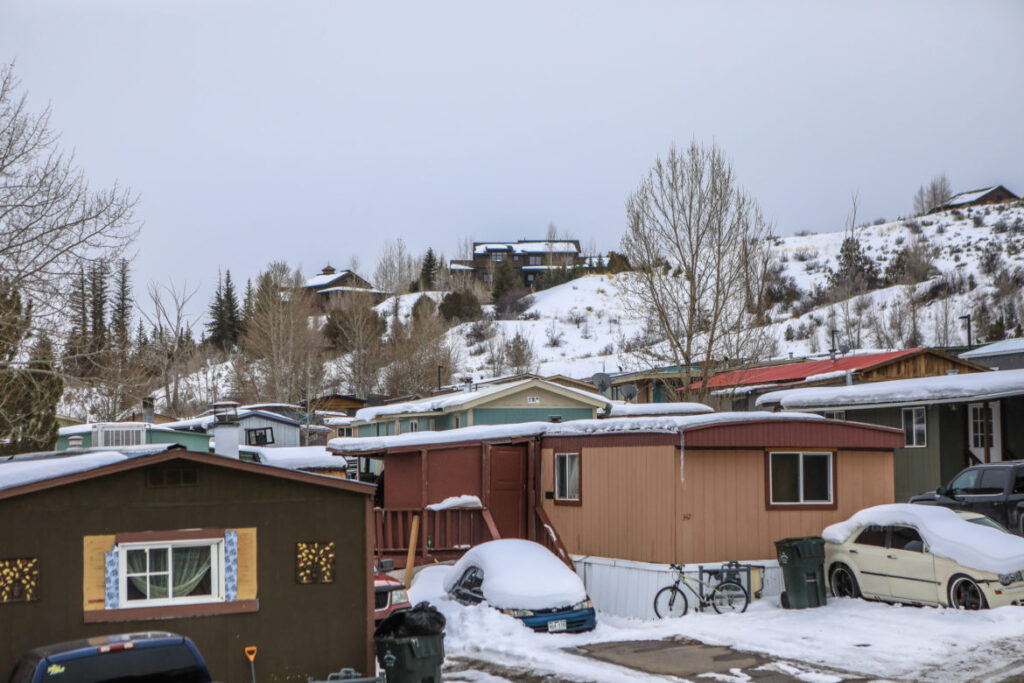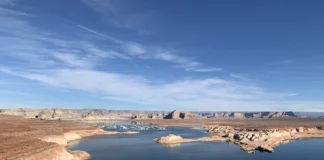This is the second of a two-part series. For part 1, click here.

EDWARDS — At a recent water-quality meeting with six residents of the Eagle River Village mobile-home park, a woman asked a simple question: “What is the motive for asking us about this? The water has been bad for so many years, and it never changes. What is the point of this?”
Her frustration, in many ways, matches that of local and state government officials who say for years they’ve felt they don’t have the tools or the regulatory teeth to get the park’s owners to improve the water, despite legislation aimed at enforcing mobile-home park regulations passed last year.
Some say state and county officials might be hesitant to use the new authority granted in that law to call for tougher regulations for fear that park owners could pull out and communities will lose crucial workforce housing. And it’s unclear whether the new law could improve water quality in the Eagle River Village park.

‘Fix the fricking water’
State Rep. Julie McCluskie, a Dillon Democrat who was a prime sponsor of last year’s legislation, has introduced a follow-up bill this session.
McCluskie recognizes the value of mobile homes as low-income and workforce housing in high-dollar real-estate regions such as the ski resort counties of Summit, Eagle, Pitkin and Routt. And she would like to see park owners take more responsibility for upgrading valuable rental assets.
“If you’re a mobile-home park owner and you want to make your life easier, then fix the fricking water,” McCluskie said. “Why leave it to the state to have to craft policy to make you take care of your residents?”
The six Eagle River Village park residents at the meeting, who did not want to be identified because they feared retribution and possible eviction from management, said little has changed at the 381-unit park, which is home to more than 2,000 lower-income and mostly Hispanic residents. Officials at Ascentia, the Littleton-based company that owns the park, counter that they’ve been taking numerous actions, including Spanish-language outreach on water quality.
Thorough testing last fall revealed well water that meets minimum federal safety standards but is high in sodium and other total dissolved solid minerals such as calcium and magnesium. It’s safe to drink but tastes salty, tests confirmed, and the company’s own survey of nearly 300 people found that the majority of residents don’t drink the park’s well water.

‘Who’s going to pull that enforcement trigger?’
Still, the company does not plan on spending the millions of dollars needed to connect to the Upper Eagle Regional Water Authority system, and state and local government officials say there is little they can do to force the issue — even with a new state law in place, which sets up a complaint-arbitration process, grants county governments more regulatory authority and increases eviction notices from 48 hours to 30 days.
At a meeting in Eagle last fall, Maulid Miskell, program manager of the state’s newly created Mobile Home Park Act Dispute Resolution & Enforcement Program, said his agency does not have jurisdiction over water issues but would refer complaints to the Colorado Department of Public Health and Environment, which does have jurisdiction.
CDPHE officials said the agency does “not have the regulatory tools to require a reduction in sodium” in a park’s well-water system. It recommends under-sink filter systems and contacting a doctor if a resident is on a low-sodium diet.
It’s also unclear whether counties will use the new law’s regulatory authority to call for tougher water regulations at the local level.
“From a resource standpoint, though — now that there’s a state program in place — I’m guessing a lot of (counties) will say it’s great that we can do it, but we’re not going to have the resources to do it, so let’s let the state handle it,” Miskell said of tougher county regulations.
Eagle County Manager Jeff Shroll, who has been working with Ascentia to improve conditions at Eagle River Village, said the company doesn’t need to go to the expense of hooking into the local water system, and he doubts counties will jump too eagerly into the regulatory fray.
“I kind of want to wait and see who’s going to pull that enforcement trigger and what’s that lawsuit going to look like,” Shroll said. “Because I don’t think your Ascentias of the world are going to go down quietly. I don’t know if it’s going to be Ascentia, but there’d be some other mobile home parks (filing lawsuits).”
But Shroll acknowledges that state lawmakers are going to keep after parks to improve conditions.
“The legislature is going to start pounding on them every session with something,” Shroll said. “Some (regulations) are going to get challenged at the constitutional level, but traditionally there’s not been a lot of tools in the shed for any kind of a government, a county or a town to go, ‘You will fix this or you will do this.’”
Shroll suggested various nonprofits and other quasi-governmental agencies might be able to step in and help with smaller-scale fixes such as replacing faulty or aging pipes, water filters or water heaters when residents don’t have the necessary resources.
Former Eagle County Commissioner Jon Stavney, now executive director of the Northwest Colorado Council of Governments, said his organization has replaced numerous water heaters at Eagle River Village but has done so using grants for energy upgrades, not water-quality problems.
Having served as a commissioner, he understands the county not wanting to push too hard. He said mobile-home parks in resort areas are “cash cows” sitting on very valuable real estate.
“Do we go after them with environmental health and have them just say, ‘Yeah, for the cost of that, I’m just going to close down and no longer rent that unit,’ or if you nail (them) for enough that (they) have to do a major investment — new well, new infrastructure — are they basically just going to one way or another, displace a bunch of people — either through redevelopment or selling it or getting rid of the people who are doing the complaining?” Stavney said.
The Eagle Valley Community Foundation and local rotary groups have offered to raise funds for infrastructure fixes for individual mobile homes.
But half the battle, which Ascentia officials said they’re trying to cope with, is getting residents to speak up and ask for help. The dozen or so residents interviewed over the past several months say they still fear stepping forward and complaining. McCluskie’s legislation may help fix that.
“One of the areas that we’ll tackle in this follow-up legislation is retaliation because currently there’s no protections against retaliation for efforts that a community might undergo to try and improve their park,” McCluskie said.
Contact information
Ascentia urges residents of Eagle River Village mobile-home park who have water-quality or water-pressure issues to call Eagle River Village community manager Maria Cisneros at 970-446-8646.
Residents can also reach out directly — and, if they wish, anonymously — to the Ascentia home office in Littleton by email at contactus@ascentia.us or by phone at 303-730-2000.
Residents can also contact CDPHE’s Water Quality Control Division by email at cdphe.commentswqcd@state.co.us or by phone at 303-692-3500.
Editor’s note: Aspen Journalism collaborates with the Vail Daily and other Swift Communications newspapers on coverage of water and rivers. This story ran in the Feb. 13 edition of The Vail Daily and was published by Aspen Journalism on Feb. 13.
This story was supported by The Water Desk using funding from the Walton Family Foundation.
The Water Desk’s mission is to increase the volume, depth and power of journalism connected to Western water issues. We’re an initiative of the Center for Environmental Journalism at the University of Colorado Boulder. The Water Desk launched in April 2019 with support from the Walton Family Foundation. We maintain a strict editorial firewall between our funders and our journalism. The Water Desk is seeking additional funding to build and sustain the initiative. Click here to donate.





